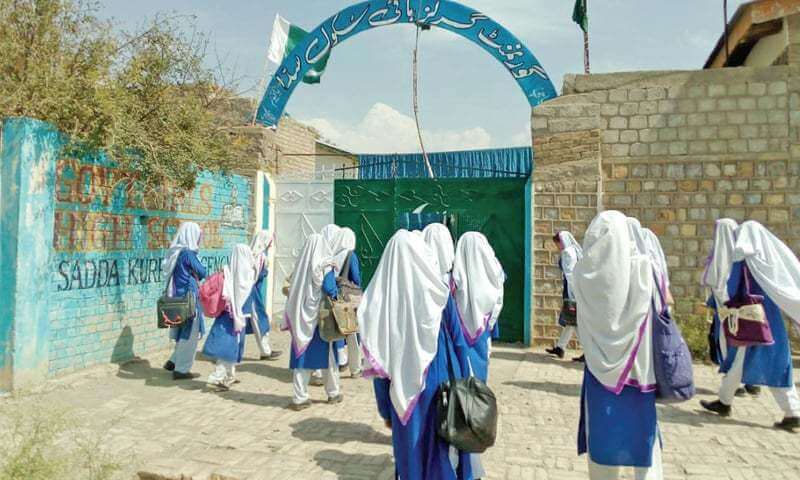
A Future Stolen: how cultural dispute resolution practices result in early marriages and barriers to education for girls
By Khyali Momanda
A 13-year-old girl from Charsadda was recently rescued from a forced marriage to a 72-year-old man. The elderly groom had promised to pay Rs500,000 to her father as part of the marriage contract. Although the police arrested the groom and Nikah registrar, the girl’s father managed to escape. This girl was fortunate to escape a life of endless drudgery and unceasing reproduction. However, the practice of child marriage continues to rob countless young girls of their innocence and dreams in the province.
Early marriage is prevalent across Pakistan due to deeply entrenched cultural taboos and patriarchal norms. Within specific communities, women are systematically excluded from decision-making processes, while young girls are expected to shoulder household responsibilities and care for younger siblings from an early age. Consequently, many girls are compelled to discontinue their education altogether.
According to the report issued by National Commission on the Rights of Child Pakistan has the highest number of women married before the age of 18 in the world. These numbers are more prominent in Khyber Pakhtunkhwa. The legal minimum age for marriage is 16 years for girls in the province. Between May 2011 and December 2023, a total of 153 cases of child marriage were reported across 12 districts of Khyber Pakhtunkhwa.
Moreover, In the former Federally Administered Tribal Areas of Pakistan, there are significant challenges for girls in accessing education, with early marriage being a major contributing factor. According to the 2017 FATA Annual Education Census, only 37% of girls were enrolled in primary school, dropping to a mere 5% at the secondary level. This disparity underscores the pressing need to address the issue of early marriage and its impact on female education in the region.
Cultural and social factors
Cultural and social factors perpetuate early marriage in the Pakhtunkhwa region. In Pakhtun society marriage is a means of perpetuating family ties, building new ties, and solidifying alliances. A man supporting his paternal grandfather’s children (Tarboor) is a cornerstone of Pakhtun social life. This tradition is referred to as ‘Tarboowalli’. Brothers arranging for their children to be married is a commonly observed practice. Kin marriages i.e.”Adal Badal” are preferred among families and tribes. Badal came into practice for settling disputes and reaching peace agreements and is also settled through blood money, Swara/Vani is other practiced reconciliatory mechanism. These peace agreements entail exchange of goods to women or girls for marriage from one family to the other. Civil society organizations have observed a decrease in Swara cases since the addition of section 310-A in the CrPC, which bans “Swara” and makes it a punishable offence.
Lack of Political Concern
Meanwhile, the insufficient political interest, economic support, and investment in educational infrastructure in FATA has compounded the issue. Many areas lack operational public schools for girls, and those that do exist often lack basic facilities and experience teacher absenteeism. The lack of access to quality education makes it easier for families to marry off their daughters at a young age. Even the Swara system is encouraged by some political leaders further entrenching gender inequality. These political attitudes, shaped by patriarchal norms and cultural traditions prioritize short term political gains over long term investment in girls.
Undoing century old laws
The implementation of the Frontier Crimes Regulation (FCR) law from 1901 to 2018 significantly restricted girls’ access to education in FATA, perpetuating tribal customs that deterred girls from seeking education. For centuries, ‘Jirgas’ or the traditional gatherings of tribal elders have played a vital role in resolving disputes within Pashtun communities, from land ownership and family matters to serious offenses. Jirgas have served as a cornerstone of decision-making in FATA, typically patriarchal systems that disenfranchise women. The merger of FATA with Khyber Pakhtunkhwa has subjected the region to provincial laws, enabling the KPK government to introduce and enforce laws and policies aimed at advancing girls’ education and preventing early marriages. These include the KPK Child Marriage Restraint Act 2019, which prohibits marriage under the age of 18, and the KPK Elementary and Secondary Education Act 2017, which mandates compulsory education for children aged 5-16.
Threat of extremism
One of the contributing factors to the decline in girls’ education is the former governance of the Taliban and the resulting security challenges prevalent in the affected regions. Khyber Pakhtunkhwa is reeling from the impact of extremist groups and the Taliban. A few years ago, they attacked a girls’ school that resisted providing education. The brutal assault on APS and Malala Yousafzai, clearly demonstrate their hostility towards women’s education.
Legal framework and international definitions
Additionally, the legal framework surrounding early marriage is inadequate. UNICEF reports that 21% of Pakistani girls marry before 18, with 53.7% of married girls aged 15-19 having never attended school. A child is defined in the convention on the Rights of the Child (CRC) as a human being less than 18 years of age. The Convention was ratified by Pakistan in 1990, which commits the state to take legislative, administrative, social and educational measures to protect and fulfill the right of all children. Furthermore, The United Nations Children’s Fund (UNICEF) defines child marriage as a formal marriage or informal union occurring between the age of 18. The threshold of 18 years of age is also used to define child marriage in several other international agreements, including the Convention on the elimination of All Forms of Discrimination against Women (CEDAW), the Universal Declaration of Human Rights (UDHR), as well as resolutions of UN Human Rights Council. It is moreover part of the fifth Sustainable Development Goal (SDG), which is to achieve gender equality and empower all women and girls.
Interview with the local
In addition, Fazal Mehmood, a resident of Mohmand, a newly merged district in Khyber Pakhtunkhwa, highlighted during the interview that; “A critical obstacle to girls’ education in the region is the scarcity of educational institutions for girls. He noted that there is no university in the entire Mohmand tribal area, forcing girls to travel to Peshawar, a three-hour distance, for higher education. The whole Mohmand area has only one recently established girls’ college, Ekka- Ghund degree college. The region has been kept backward by British government as well as the government of Pakistan”.
Consequences of Early Marriage
However, early marriage not only disrupts a girl’s education but also has significant negative consequences for her health and well-being. Child brides are more likely to experience domestic violence, have children at a young age, and face greater health risks during pregnancy and childbirth. Additionally, the earlier a girl is married, the more children she tends to bear, contributing to overpopulation and impeding her opportunities for personal growth and development.
The practice of early marriage puts girls at a higher risk of developing psychological disorders due to restrictions on their freedom of expression and exposure to harmful traditional practices. Research shows that women who marry before the age of 18 have higher rates of psychiatric disorders compared to those who marry as adults (Le, 2011).
Early married women are more likely to seek healthcare services and may experience physical, emotional, and social trauma that leads to psychological distress, hindering their educational and career opportunities (Singh, 1996).
Maternal complications and mortality risks during pregnancy and childbirth are also higher among early married women, leading to adverse outcomes for their children (UNICEF, 2005).
To address early marriage, policies should focus on educating families and communities, raising awareness, and empowering girls through education and employment (Rahman, 2005).
Additionally, education not only delays marriages and pregnancies but also educates girls on reproductive health issues, reducing risky sexual assaults within marriage (Dakar, 1984).
Implementation of Existing Laws
To combat early marriage and promote girls’ education, it is essential to enforce existing laws, such as Article 25-A of the Pakistani Constitution, which guarantees the right to education for all children aged 5 to 16. Increasing the legal marriage age from 16 to 18 could also help retain girls in school longer, allowing them to pursue education and to live life on their own terms with freedom. By addressing the cultural, political, and economic factors contributing to this practice, and by prioritizing girls’ education, we can strive towards a future where all children, regardless of gender, have equal access to quality education and the opportunity to maximize their full potential.
Recommendations
In Khyber Pakhtunkhwa child Mariages are regulated by the Child Marriage Restraint Act, 1929.In Pakhtunkhwa the legal minimum age for marriage is 16 years for girls. Moreover, verbal Nikah is the norm, and it does not require any documentation. It is necessary to ban verbal nikah and make CNIC mandatory for Nikah and marriage registration.
The Way Forward
To effectively tackle this issue, a comprehensive approach is necessary. Enhancing security in the region and ensuring a safe environment for pursuing education are crucial. The government must prioritize investment in infrastructure development, including the construction of more girls’ schools, and the provision of adequate resources and training for educators. Additionally, it is essential to encourage families to send their daughters to school and rigorously enforce legislation prohibiting child marriage to promote and bolster girls’ education.

A literature devotee Writing for the voiceless fighting for the fearless.



